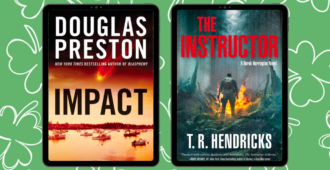 Written by Carolyn Baugh
Written by Carolyn Baugh
Although Shoreline reflects my own terror that toxic national discourse could morph into widespread violence against minorities, immigrants, and refugees, Erie is in fact a safe haven. Refugees comprise ten percent of its population of one hundred thousand. The cost of living is low, the crime rate is low, and it is possible to rebuild lives along this shore.
As a professor at Gannon University, I run an oral history program designed to allow my students to conduct interviews with Erie’s diverse refugee population. It’s a world history class, but I actually pummel my students with refugee issues from day one. Early North and South American settlers were often religious refugees such as the Huguenots, expelled from France for their Protestantism. The Trail of Tears was walked by native refugees forced beyond the borders of the Cherokee homeland. Fugitive slaves were race refugees. The State of Israel became populated by Jewish refugees fleeing European pogroms and later the Holocaust. Somewhere in all our histories, the class none too subtly conveys, some ancestor had to cross a border and begin again because of how he looked or what he thought or how he worshiped. As my students record oral histories of local refugees, I have heard many such begin-again stories from Bosnians, Iraqis, Bhutanese, and now Syrians.
This spring my students trooped over to Erie’s Office of Refugee Resettlement and sat down with members of the recently-resettled Syrian population. My students often come to class enshrouded in a disheveled ennui, but on this occasion they were tidy, alert, and nervous. In teams of two or three, they began asking questions and trying their best to actually listen to the responses—always the hardest part of the oral history interview.
We heard stories of arrests and murder, loss and suffering. We heard about food and childhood friends and fishing and street soccer. The pleasure and pain of the oral history interview is that unlike a story on a page, you are forced to fully engage with the human in front of you. It is not a book that can be put aside for another, more comfortable moment.
From my often-shrill internet bubble, Syrian refugees and their hardships represent the worst aspects of the current administration’s worst policies. So when my students asked what is hard about the adjustment to life in Erie, I was surprised to hear a common theme. No complaints. Yes, the language barrier is hard—it is by far the hardest thing. But overall, here, in Erie, in the United States, we are finally able to feel what it is to be human. We are treated with dignity…People we do not even know smile at us in the street.
Syria’s war has been injury added to insult. I had forgotten, from my years living in Egypt, how relentlessly classist the Middle East can be. How the permanent underclass can be abused just for breathing in and out. How the upper- and even middle-classes can assess them immediately, based on pronunciation, on garb, and on demeanor, and discard with a harsh tone. How a government bureaucrat can make someone run all day long to chase the simplest necessity—a form, a permit—and ultimately demand a bribe to make it happen. Indeed it was this very issue of abuse of the underclass that caused a desperate young Tunisian vegetable seller to self-immolate, launching the Arab Spring revolutions.
Thus I was riveted and relieved as I heard Mahmoud say, I have dignity here, I am treated like a human being…and he spoke of his experience in the department of motor vehicles. He said what it meant to him that he took a number, and they called his number, and he was dealt with just like any citizen. He walked in, waited his turn, and walked out with precisely what he went there to obtain: a driver’s license.
I have to admit that a surge of pride in my local license branch was not an emotion I’d anticipated ever having.
Eight months is the longest any of the refugees who shared their stories with us had been in the country. After fleeing to Jordan or Egypt and then waiting interminably to be vetted and researched and investigated and tested, they were sent to Erie without having any notion of where Erie might be. Ali explained that both Assad regimes had trained their people to think Americans were the enemy, and so when he found out he was being sent to the U.S. he was fearful. …But now I want to tell the world how kind Americans are… and that our leaders have been lying to us.
Ali and the others spoke to us quietly. Some wept. I watched many of my students weep too. Several had never met anyone from a foreign country before. Witnessing these mutual gifts of listening and story-sharing, I found myself wishing we could all sit down and listen to each other’s stories before dismissing, discarding, and dehumanizing. Until we can, though, it is encouraging to know that on the streets of my city, many are undistracted by rhetoric because they are too busy reacting instinctually—with a smile as they pass and with simple good manners.
Lots of stuff gets blown up in my book. I throw around a lot of gun jargon. There are chase scenes and villains and tunnels and a tooth-rattling amount of sirens. Captive of my pen, this town has some seriously rough days. Its daily reality, however, is deeply different. In a world seething with brutality and upheaval, neighborly grace makes Erie an easier place to be a human being.
Order Your Copy
Find Carolyn Baugh online on her website.













Thank you for your dedication to showing students first hand that these are people, and they have been through a lot, I wonder how many of us would be so happy if the situation was reversed, and we were forced out of our homes, away from friends, and to a foreign country. Very well done.